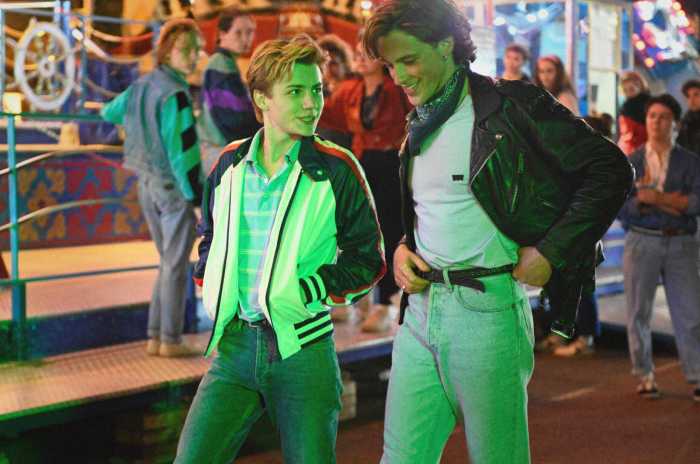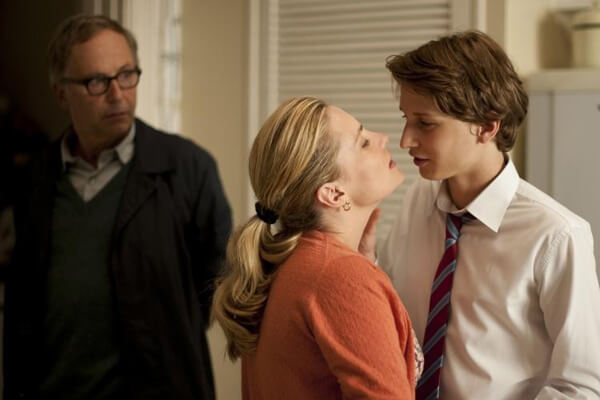Fifty years after Rainer Werner Fassbinder made his masterpiece, “The Bitter Tears of Petra Von Kant,” enfante terrible, François Ozon has reworked it as “Peter Von Kant,” shifting the gender of the title character, and having actor Denis Menochet play the lead role as a version of Fassbinder. The result may feel like a gimmick, but Ozon is clearly paying homage to the extraordinary German filmmaker whom he adores. (Ozon’s 2000 film, “Water Drops on Burning Rocks,” was adapted from a Fassbinder play.)
This new film is a smart, engaging “reimagining” of the work. Ozon has “liberally adapted” the original film, which was based on a play Fassbinder wrote about his failed relationship with a young actor he loved. (The dialogue in the original play/film is said to contain verbatim exchanges Fassbinder had with the young man.)
There are some noticeable differences between the two films. “Bitter Tears” featured an all-female cast, and the titular character was a fashion designer. Ozon’s version, which is 40 minutes shorter — and moves more nimbly than the original — has Peter as a filmmaker in 1972 Cologne. Moreover, whereas Fassbinder shot “Petra” in one space, Ozon opens things up slightly, shooting from outside Peter’s apartment on a few occasions, and having one scene take place in an entirely different location altogether. These are minor differences, and purists may carp, but Ozon is putting his own clever spin on the material.
The story is pretty slight, but it contains strong emotions. Peter’s friend Sidonie (Isabelle Adjani) introduces him to Amir (Khalil Gharbia) and Peter immediately falls in love with the young man. He soon invites Amir, who is married, to live with him and be in one of his films. As Amir starts to achieve success, the relationship begins to fall apart, which drives Peter to rage and tears.
Part of the success is Menochet’s go-for-broke performance, which makes Peter sympathetic at times — Petra was ice cold — even though he abuses his long-suffering assistant, Karl (Stefan Crepon), who is silent, but incredibly expressive. (Crepon’s reaction shots are priceless, and the film is amusing whenever Peter barks “Karl!”; the young man sometimes flinches but he always responds like Pavlov’s embittered dog.)
The burly Menochet makes Peter fascinating as he is mesmerizing as he looks into a mirror and sings, “Each man kills the thing he loves.” (The song was used in Fassbinder’s last feature, “Querelle.”) His devilish eyes practically devour Amir when he first meets the young man. Watching Peter slurp oysters and suck on shrimp during a meal with Amir is delicious as well. But when Peter has Amir sit for a screen test, things get serious, and Peter picks up the camera and gets closer — as if to get emotionally intimate with Amir — when the young man tells a horrific story about his parents’ death. Peter and Amir share physical intimacy and a post-sex cigarette moments later. A scene of Peter dancing with a nude Amir after sex depicts the height of their romance, and a fun and not very subtle sight gag has Karl popping a champagne cork while Peter and Amir are having sex.
But things soon sour. Amir taunts Peter with stories of a lover, which frustrated the filmmaker to no end. Peter’s jealousy builds and the power struggle between these two lovers reaches an ugly crescendo. The eyes that once consumed Amir with desire are now filled with fury. In what may be the film’s most emotionally naked moment, Peter asks Amir why he was with him — was it the career opportunity, the money, the sex, or was it love? Ozon lets the lies and truth hang in the air like smoke from a stale cigarette.
“Peter Von Kant” plays up the melodrama, and while Ozon is not winking at the audience in a camp fashion, he certainly is inviting viewers to appreciate Peter reveling in his despair. When Peter embraces full-size posters of a shirtless Amir on his walls or burns an image of his lover — such is his despair at being abandoned by the young man — it magnifies his obsession, even though his devotional love is as sudden as it is all-consuming.
However, Ozon’s obsession/love for Fassbinder is evident throughout the film, from the opening credits, which unfold over an image of the German filmmaker. Peter is dressed in one of Fassbinder’s trademark white suits for the film’s last act, and Hanna Schygulla, who appeared in “Bitter Tears,” plays Peter’s mother in this film. (She even sings a German lullaby to him in one touching moment.) Ozon may have deliberately given Amir the last name Ben Salem, a reference to El Hedi Ben Salem, who starred in Fassbinder’s “Ali: Fear Eats the Soul,” and was the director’s lover for a spell. Likewise, the poster for “Peter Von Kant” is a takeoff of Andy Warhol’s poster for Fassbinder’s “Querelle.” There are likely dozens of other references for Fassbinder aficionados to appreciate.
But while lovers of “Bitter Tears” are likely to be disappointed by this version, “Peter Von Kant” is an admirable stunt that works well taken on its own terms.
“Peter Von Kant” | Directed by François Ozon | Opening September 2 at the IFC Center | Distributed by Strand Releasing



































